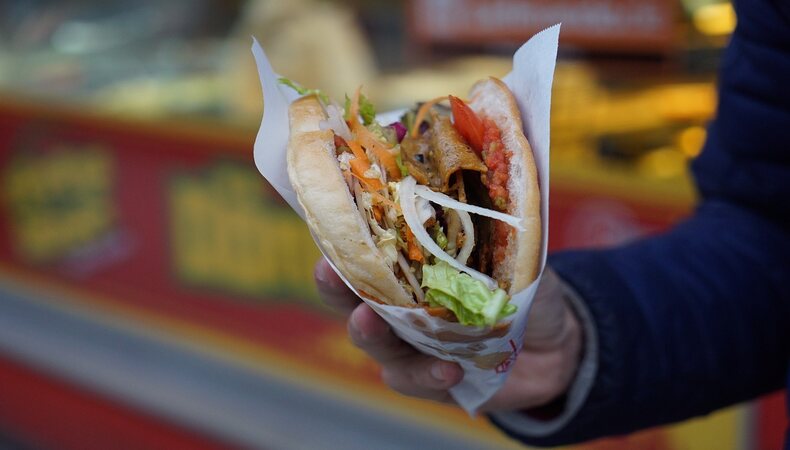Berlin’s Beloved Döner Kebab Faces Possible Regulations from Turkey

Thin slices of meat are cut off vertical spits in the middle of Berlin’s hip Mitte area, releasing the seductive scent of sizzling beef and chicken. Two chefs at Kebap With Attitude, a well-known local restaurant, deftly create the renowned street food staple from griddle to toaster while freshly cut tomatoes, cabbage, and red onions wait their turn to be wrapped into warm pita bread. For many Berliners, this energetic atmosphere is connected with the great cultural variety of the city, where the döner kebab has become a dear component of the local gastronomy.
Still, this common snack is now the focus of a contentious argument that might change its future in Germany and elsewhere. Turkey has lately sent a proposal to the European Commission aiming at controlling what can formally be called a döner kebab. Should this proposal be granted, this action could bring new guidelines influencing not just the preparation technique but also the kind of substances permitted. The Berlin-based Association of Turkish Döner Producers in Europe estimates that a sector worth an estimated €2.3 billion in Germany alone and about €3.5 billion across Europe is under jeopardy.
Döner Kebab: An emblem of gastronomic fusion
The Turkish verb “dönmek,” which means “to turn,” fits the meat as it gently turns on a vertical spit for hours, becoming crisp and golden before being finely sliced. Traditionally cooked with lamb and presented on a platter, the meal originated in Turkey. When Turkish immigrants introduced it to Berlin in the 1970s, though, they modified the dish to fit local preferences by substituting beef and chicken for lamb and presenting it on pita bread. The Berlin-style döner kebab sprang from this adaptation and soon became a mainstay of the city’s cuisine.
Deeply Turkish, Deniz Buchholz, proprietor of Kebap With Attitude, grew up in Berlin. He traced the evolution of this now-iconic street cuisine. Buchholz said, remembering how Turkish immigrants invented stuffing the döner meat, vegetables, and sauce into pita, inventing what would become the Berlin döner kebab, “they realized that the Germans like everything in the bread.” This invention marked the start of a gastronomic heritage reflecting the mix of Turkish customs with the distinctive tastes of the German metropolis.
Turkey’s Regulatory Proposal: Seeking Tradition
Turkey formally asked the European Commission in April to have the döner kebab given “traditional specialty guaranteed” status, therefore honoring and safeguarding traditional food products. Although this level of classification is less restricted than the esteemed “protected designation of origin,” which relates to regionally particular goods like French Champagne or Italian Parma ham, it would nonetheless set rigorous standards for the cooking of the döner kebab all throughout Europe.
Turkey’s suggestion details particular rules for chicken and beef kebabs. For example, beef needs to be marinated with precisely calibrated amounts of animal fat, yogurt or milk, onions, salt, and thyme along with a combination of black, red, and white peppers from cattle at least sixteen months old. The finished product would have to be cut into 3 to 5 millimeter thick slices. Likewise rules would apply to chicken kebabs, including slicing and seasoning techniques. Furthermore forbidden under the proposed rules might be any variations from the classic recipe, including turkey, veal, or presenting the kebab with vegetables.
By September 24 the European Commission is supposed to decide on Turkey’s application. Should the eleven objections expressed by several entities, including the Federal Ministry of Food and Agriculture of Germany, be judged legitimate, Germany and Turkey will have six months to work out a settlement. Whichever the result, the European Commission will finally have the last word on the matter.
Germany Pushes Back: Argues for Döner Diversity
Germany’s response to Turkey’s suggestion has been one of astonishment and opposition as well. Germany’s Federal Ministry of Food and Agriculture stressed in a statement sent to the Associated Press the significance of keeping the döner kebab as a symbol of cultural variety within the nation. “The kebab is part of Germany, and the diversity of its preparation methods reflects the diversity of our country,” the ministry said, underlining that any attempt to enforce tight criteria would harm the spirit of invention which has defined the evolution of the döner kebab in Germany.
The federal food and agricultural minister for Germany, Cem Özdemir, Turkish-born, expressed his worries more explicitly. “The kebab comes from Germany.” Everybody should be free to choose for themselves how this is cooked and consumed here. Guidelines from Ankara are not necessary, Özdemir stated on social media platform X, formerly Twitter. Germany’s döner kebab is known for its variants and adaptations, which reflect the tastes of local consumers, he noted. Serving beef, chicken, vegetables, or even veal, the German döner has evolved into a flexible meal appealing to a broad spectrum of palates.
What stands at risk for the Döner Industry of Germany?
Should Turkey’s request be approved, the consequences might be major for kebab shop owners all throughout Germany, many of whom worry that the new rules would stifle their innovation and cause disturbance in the sector. Apart from a gastronomic phenomenon, the kebab company in Germany is a main economic engine. Nearly every street corner in Berlin and other towns has Döner stores; their reasonable rates and fast service have made them a favorite among both residents and visitors.
The German Hotel and Restaurant Association has voiced worries that the suggested regulations would harm the kebab industry, therefore causing legal obstacles and financial problems for small businesses owners. Their comment focused on the need of maintaining the variety and adaptability that have let the döner kebab flourish in Germany for many years. “The diversity of the kebab must be preserved,” the association said, capturing the attitude that many in the business have.
Döner Kebab and Politics: Beyond Simply Street Food
Fascinatingly, the fate of the döner kebab now permeates politics. Rising kebabs prices—which have skyrocketed into double-digit euro values in certain areas—recently led Germany’s Left party, Die Linke, to demand a “price break” to support the popular street cuisine. The idea aimed to establish a maximum döner kebabs price to enable public affordability of them. German Chancellor Olaf Scholz finally turned down the offer, citing growing food prices as a result of war in Ukraine driving increased energy costs.
Moreover, the döner kebab has even been involved in international diplomacy. German President Frank-Walter Steinmeier carried a complete skewer of döner meat with him on a visit to Turkey in April, signifying the close cultural links between the two countries. Though Turkish President Recep Tayyip Erdogan’s increasingly autocratic regime has generated conflict in recent years, the visit, which marked the first official trip to Turkey by a German president in a decade, underscored the strong ties between the nations.
The German Future of Döner
Although many kebab shop owners, like Deniz Buchholz, find the future unknown, they still hope Berlin’s gastronomic inventiveness will take front stage. Buchholz thinks the spirit of Berlin’s food culture will keep flourishing while some worry the new rules will impair the quality of the döner kebab. “We will go the Berlin way and we’ll find a solution to name it differently,” he stated, implying that, should it be needed, kebab stores just change their items, maybe calling a vegetable kebab a “veggie sandwich.”
The European Commission has final say on this matter. One thing is certain, though, for the millions of döner kebabs consumed in Germany and Europe: this cherished meal, a symbol of ethnic fusion and flexibility, has to stay as flexible and varied as the local populations. Whether by innovative adaptation or negotiations, the döner kebab is probably going to withstand the regulatory storm and remain dear in German street food culture.




